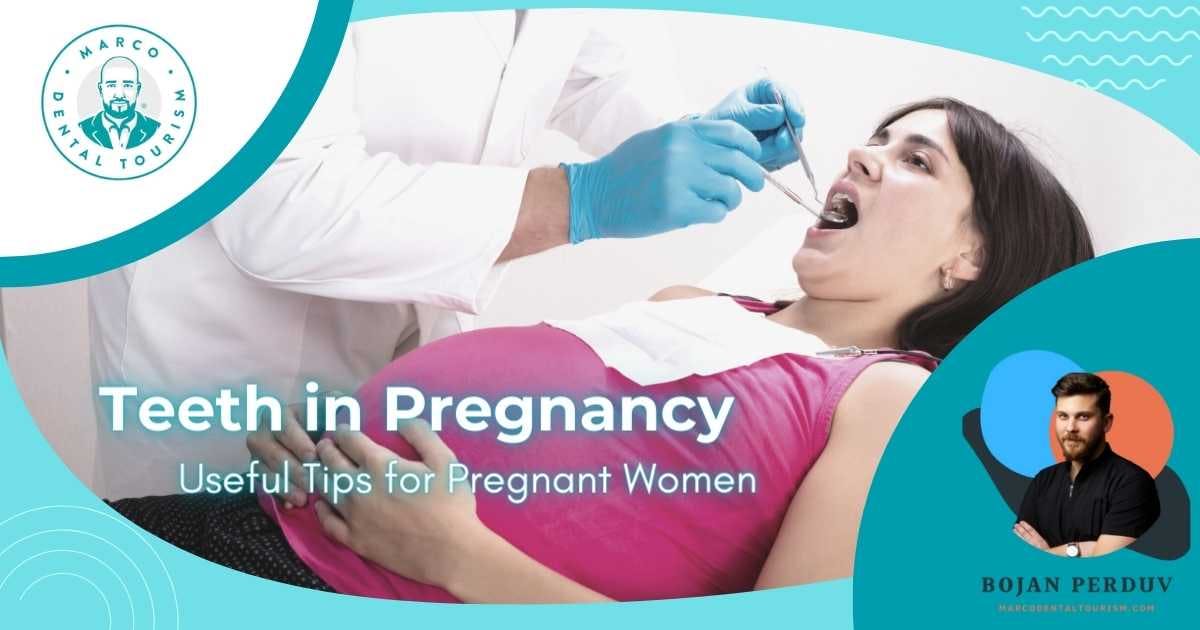Teeth in Pregnancy: Useful Tips for Pregnant Women

Pregnancy is an unforgettable time in a woman's life - a time of new life, new beginnings and joy. It is also a time when the female body faces many changes and challenges. One of the big challenges is taking care of your dental health. In this text you will learn everything about teeth during pregnancy! We give advice on how to properly care for your teeth, prevent mouth and gum diseases, as well as ways you can keep a healthy and perfect smile throughout your pregnancy.
Are teeth more sensitive during pregnancy?
Yes, teeth can become more sensitive during pregnancy due to hormonal changes that can cause an increase in the amount of plaque on the teeth, which can lead to gum inflammation and tooth sensitivity. Also, morning sickness can cause an increase in acidity in the mouth, which can also contribute to tooth sensitivity.
Why does tooth decay occur more often during pregnancy?

Caries may be more common during pregnancy for several reasons:
- Hormonal changes. During pregnancy, the hormonal composition of women changes, which can make the gums more sensitive, prone to inflammation and bleeding. This can make it easier for bacteria to enter the bloodstream and cause infection.
- Sickness. Pregnant women are often prone to morning sickness, which can cause vomiting and increased acidity in the mouth. The frequent presence of acid can break tooth enamel and lead to tooth decay.
- Decreases in the amount of saliva. The production of saliva responsible for cleaning the mouth often decreases during pregnancy, which can lead to the accumulation of plaque and bacteria in the mouth, and subsequently to the development of dental caries.
- Increased sugar level. Pregnancy can also lead to an increase in blood sugar levels in the body, which can encourage the growth of bacteria that cause tooth decay.
- Excessive consumption of junk food. The desire for sweet and sour food increases during pregnancy, creating a fertile ground for many dental problems, including tooth decay.
What causes toothache during pregnancy?

Toothache is most often the result of hormonal changes that occur during pregnancy, as a result of which the body's immunity decreases, while the teeth become susceptible to various infections. However, toothache during pregnancy can also be caused by other factors such as:
- Morning sickness: Morning sickness can cause heartburn and vomiting which can cause stomach acid to come into contact with the teeth. The frequent occurrence of this problem can lead to erosion of tooth enamel, which causes pain and an unpleasant sensation in the mouth.
- Increased progesterone levels: The hormone progesterone changes the functioning of a woman's blood flow which can lead to gum problems such as gingivitis or gum inflammation making the gums red, swollen and painful.
- Stress: The stress that pregnancy brings with it can cause unconscious teeth grinding which can cause intense toothache.
- Headache: Pain or a feeling of tension in the head is transmitted to the jaw and jawbone, and may indicate an acute dental problem.
Why do teeth and gums bleed during pregnancy?
Here are five possible reasons why you may experience bleeding teeth and gums during pregnancy:
- Increased blood flow: During pregnancy, blood volume increases by approximately 50%. This increase in blood flow can cause your gums to become more sensitive and prone to bleeding.
- Changes in hormonal composition: Pregnancy is associated with numerous hormonal changes, which can also be the reason for increased gum sensitivity and bleeding. That's why it's important to monitor your condition during pregnancy and get treatment to relieve pain and discomfort in time.
- Morning sickness: Morning sickness can also contribute to bleeding gums. This is because stomach acid can irritate the gums and cause them to bleed.
- Irregular oral hygiene: Not brushing and flossing regularly can also lead to bacteria and bleeding gums.
- Vitamin C deficiency: Vitamin C is needed for the development of collagen, which is a key component of healthy gums, the lack of which makes the gums resistant and unprotected against bacteria.
What causes sickness after brushing teeth?

The most likely reason is the usual morning sickness during pregnancy. Nausea is caused by natural hormonal changes during pregnancy. If you feel nauseous after brushing your teeth, try using a milder toothpaste and mouthwash, and you can also eat a light meal before brushing.

Tooth extraction during pregnancy may be necessary in some cases, such as an infected or spreading infection, preventing the proper growth of other teeth, or the occurrence of intense pain that causes discomfort and prevents the mother from eating. The reliability of extraction must be assessed by your doctor.
How to save teeth during pregnancy?
Although the risk of developing various dental diseases during pregnancy is higher, fortunately, there are many ways in which you can prevent the occurrence of diseases and preserve the health of your teeth:

- Follow your regular dental hygiene routine. This includes brushing your teeth at least twice a day, flossing, and using mouthwash.
- Eat a nutritious diet: A diet rich in fruits, vegetables and whole grains helps maintain healthy teeth and gums.
- Limit sugary foods and drinks: Too much sugar can permanently damage teeth and gums.
- Drink plenty of water to keep your mouth hydrated.
- Avoid alcohol mouthwashes: Alcoholic mouthwashes can dry out your mouth and damage your teeth.
- Try to manage your stress. Pressure on the teeth and grinding of the teeth due to stress cause pain in the teeth and jaw, as well as the problem of crooked teeth.
- Get enough rest and walk. Any form of relaxation helps promote overall health and well-being of the body.
- Talk to your dentist about any concerns you have about your oral health during pregnancy.
Conclusion about the teeth during the Second State and Pregnancy
Teeth are an important part of our overall health and taking care of them during pregnancy is crucial for both mother and child. Although pregnancy can be an extremely challenging time, it is also a time of new life and hope. With proper care, your teeth can remain healthy and durable at every stage of life.











Share your opinion!
What do you think about this topic?
Comments (0)